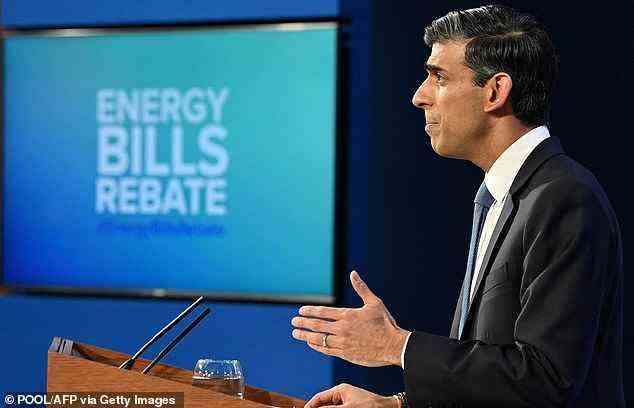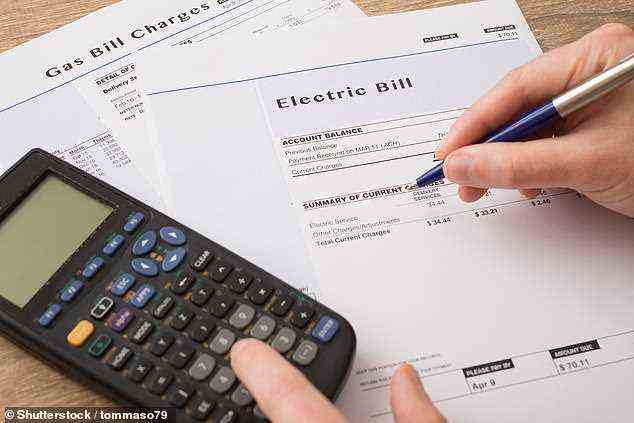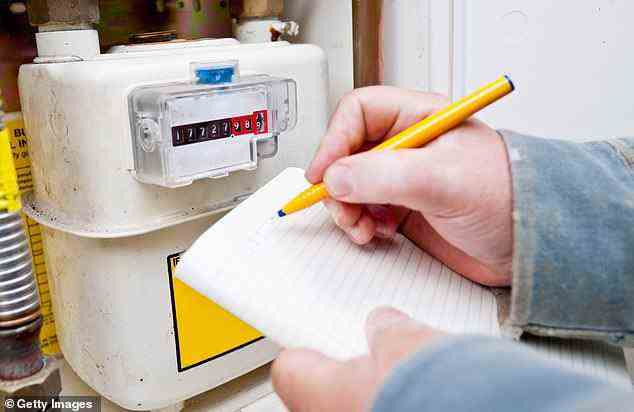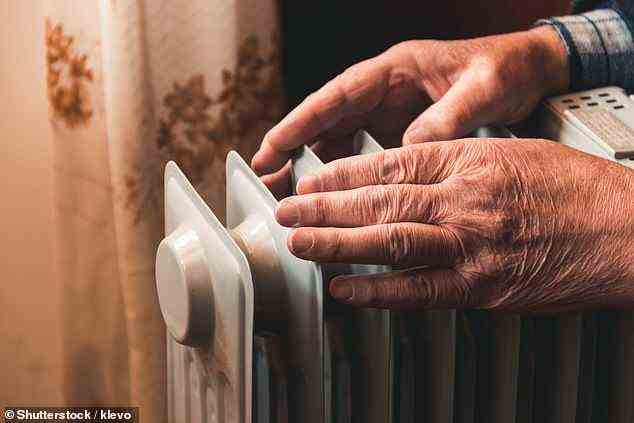Surging power bills are fuelling the worst cost-of-living crisis in Britain for 30 years.
Households have already seen big rises in heating costs this winter, but will be hit with a further 54 per cent hike in April – close to £700, on average.
Bills are also expected to soar again in October, if not sooner, as the crisis shows no sign of cooling.
Crisis point: Households have already seen big rises in heating costs this winter, but will be hit with a further 54 per cent hike in April – close to £700, on average
Chancellor Rishi Sunak last week announced a multi-million-pound support package to ease the pain for households. But millions who need help will miss out, and others will have to pay back more than they receive.
As the nation braces itself for an energy bill blow that could last for three years, suppliers are accused of keeping customers in the dark and luring some into poor-value deals.
In a special energy edition, Money Mail today reveals:
- The average monthly energy cost could hit £320 next winter.
- Swathes of the country will miss out on £150 council tax rebates — including two million pensioners.
- Around £200 million of credit owed to customers by suppliers that have gone bust is unaccounted for and will add £10 to every bill.
- Supplier call-waiting times are soaring as confused customers panic.
- Direct debits are being doubled or even tripled without warning — and months before the energy cap rises.
- Providers are accused of promoting more expensive fixed deals, as well as sending out-of-date price and guidance to customers.
So what does the crisis mean for your money? How much should you really be paying for power, and is there any way to save? Here is Money Mail’s essential guide to surviving energy bill bedlam . . .
When will the price hike hit?
Families know they are going to have to pay a lot more to power their homes — but how much more?
Energy firm customer service teams were struggling to cope with increased demand last week as worried customers flooded their phone lines.
British Gas was warning callers they may have to wait nearly an hour, while Scottish Power customers were told they’d be waiting more than 30 minutes.
EDF had an automated message to say: ‘If you are calling about the Government announcement we have no more information at this time.’

Support: Chancellor Rishi Sunak (pictured) last week announced a multi-million-pound package to ease the pain for homeowners. But millions who need help will miss out
The average household on a standard variable tariff will see their annual bill rise by £693 a year when the price cap rises to £1,971 in April. So far Scottish Power and EDF Energy have confirmed they will be hiking prices then.
Analysis for Money Mail by The Energy Shop today also reveals that, if the price cap rises a further 15 per cent in October, average monthly bills will hit £189. The cost of supplying gas and electricity for the average home could also peak at £320 next January.
Regulator Ofgem first introduced the price cap in January 2019 to stop suppliers charging more than a set price for every unit of gas and electricity on their standard variable tariffs.
It is now consulting on changes which could see it reviewed every three months rather than every six.
The exact impact of the new cap on your bill will depend on how much energy you use.
A typical customer in a one-bedroom flat will see their annual payments rise by £405 to £1,235, according to Energyhelpline.com. Yet someone in a six-bedroom property faces a £935 increase to £2,779 a year.
Eight in ten customers are now on a standard variable tariff — up from just over half last year. It means 22 million households will be hit by the price cap rise.
Around 368 fixed energy tariffs are also due to end in the first three months of this year, which will see another 700,000 households moved on to their supplier’s default deal.
Those with traditional meters should take readings the day before the price cap is hiked on April 1 to ensure they pay for power used at the lower rate.
Around 4.5 million households with a pay-as-you-go energy meter will be hit even harder as their price cap is increasing from £1,309 to £2,017.
If you have a prepayment meter, you can ask your supplier to switch you to a credit meter, where you pay for bills quarterly or by monthly direct debit. But if you are in debt or have a history of missed payments, it will likely refuse.
Why are standing charges rising?
Three in four families have seen their bills hiked in the past year, according to a Consumer Intelligence poll for Money Mail.
A quarter of all respondents said they were paying between £51 and £100 a month more than they were a year ago.
But as well as paying for each kilowatt of energy you use, suppliers also charge a fixed daily fee to cover the cost of supplying power to your property.
These so-called standing charges are also increasing. From April, firms can charge up to 45p a day for electricity — up from 25p. For gas, the cap is rising by 1p to 27p.
It means the average family will pay £265 a year in standing charges, up from £186. As the charges are fixed, those in smaller homes who use less power will be disproportionately affected.
Much of the increase is down to the collapse of more than two dozen energy firms since last summer.
Ofgem has paid suppliers £1.84 billion to take on these customers and now needs to recoup the money — which works out at around £68 per household. Around half of this will be recovered through standing charges.
The regulator says network maintenance costs have also increased and firms that supply fossil fuels are now having to pay a new Green Gas Levy.
Is now the right time to fix?
Energy prices are expected to remain high until 2025 — but the cheapest fixed tariff for the average household currently costs around £870 a year more than a standard variable deal.
Experts say wait. If you are on a fixed deal ending soon, your supplier will write to you to explain your options. However, customers must take care as some firms are pushing costly fixed tariffs.
In a renewal email sent to customers in January, E.on told them that if they did nothing they would be moved to a variable tariff ‘that may be more expensive’.Yet, it was 76 per cent a year cheaper than the fixed deal offered.
And in an email to customers last week, Octopus Energy listed its cheaper variable tariff below a 12-month fixed deal that was 47 per cent a year more expensive.

Hikes: The average household on a standard variable tariff will see their annual bill rise by £693 a year when the price cap rises to £1,971 in April
Is it still worth switching?
Many comparison sites have withdrawn their energy-switching services because any new deals available will likely cost more than a standard variable rate tariff.
So if you want to switch because you are moving house or unhappy with your provider’s customer service, you may have to contact your new firm directly.
Last year some energy firms stopped taking on new customers when soaring wholesale costs led to the collapse of 26 suppliers.
But regulator Ofgem has said suppliers must continue to offer tariffs to households. The largest firms, including British Gas, Scottish Power and EDF, are accepting new customers.
Tom Edwards, of energy analysts Cornwall Insight, says prices are not likely to fall until summer next year.
He adds: ‘Without significant changes to the way we procure, supply, and consume energy, we are likely to see many years of boom-and-bust energy pricing.’
To ensure you don’t miss out on cheap deals when they return, sign up for future alerts from comparison sites such as Energyhelpline and Comparethemarket.
How do I know my bill is correct?
Complaints about inaccurate bills are soaring, according to the Energy Ombudsman.
The new price cap means households should expect to see their direct debit payments rise by around 54 per cent from April.
Taking meter readings once a month is the best way to ensure you are paying for the energy you use. Always double check the readings on your bill against your meter.
If there is a big difference, contact your supplier. Strict back-billing rules mean firms are not allowed to charge customers for energy debt from more than 12 months ago if they co-operated with readings.
If you think there is a fault with your meter, ask the firm to send out an engineer. But if there is nothing wrong, you may have to pay.
Ovo, for example, charges a £157 fee for testing gas meters. Customers signed up to energy deals that claim to offer 100 per cent renewable electricity may also wonder why they are impacted by soaring wholesale prices.
This is because there is not enough electricity from renewable sources to go around. And around a third of electricity on the grid is generated by gas.
Your energy bill will say how much gas and electricity you are using in kWh. This stands for kilowatt hour.
It will also show the price of each unit you use on your current tariff plus the standing charge, which covers the cost of supplying you.
You should see the record of your meter readings — either actual or estimated.
What’s the best way to pay?
Around two in three households pay their bills by monthly direct debit. Suppliers estimate how much power you will use over a year, and split this into 12 equal payments.
In the summer, when you do not have the heating on, you will build up credit. This will help prevent you from being hit with a shock bill in winter when you use more energy.
Providers also often offer customers a discount to pay this way. According to Ofgem, people who pay by cash or cheque will be charged £130 more over a year.
If you are still in credit after winter, it’s likely you are paying too much. Experts usually advise customers to claim this back and ask for their monthly payments to be lowered.
But you may want to consider leaving this money in your account this year to shield you against price rises.

Keep track: Taking meter readings once a month is the best way to ensure you are paying for the energy you use
Does the price cap protect everyone?
Millions of customers are not protected by the price cap and could see their energy bills rise by as much as 400 per cent.
Around 1.5 million (4 per cent) of UK homes are powered by oil and many are in rural areas.
The price of heating oil has soared from 41p to 63p per litre in the past year, according to comparison site boilerjuice.com.
The average household uses 1,800 litres of oil a year, pushing up annual bills from £738 to £1,134 — and set to soar higher.
Sarah Coles, of Hargreaves Lansdown, says: ‘Oil producers are not in a rush to flood the market in case a surge in the pandemic weakens demand, so supply is likely to remain relatively sluggish in the immediate future. High demand will continue to mean high prices.’
Around 500,000 households are supplied by communal heating systems — often known as heat networks or district heating. This is where one generator supplies blocks of flats or entire housing estates.
The Government wants five million households to be supplied by these networks by 2050. But unlike ordinary tariffs, these suppliers have to buy gas from the commercial grid where prices are higher.
Steve Knight, of consumer group the Heat Trust, says: ‘The companies which operate these systems are paying up to 400 pc more for gas than they were last year. This means families with communal heating could be facing massive bill hikes.’
Are green tariffs safe?
A small number of energy providers, including Ecotricity, Good Energy and GEUK, are permitted to charge more for their variable tariffs as they support the production of renewable gas or electricity.
Good Energy, which supplies 84,000 households, charges £2,230 a year for its standard variable deal — £953 more than the current price cap.
A spokesman for Good Energy says it has no plans to increase the price of its deal in April.

Around 2.2 million households qualify for the Warm Home Discount worth £140. The Government plans to extend this to help an extra 780,000 pensioners and low-income families
What if old firm still owes me?
Some 26 suppliers have gone bust since August last year. Yesterday Ofgem boss Jonathan Brearley told MPs that collapsed suppliers may have lost £200 million in credit owed to customers.
He said every UK household would have to pay an extra £10 on their bills to recoup it. If your energy firm goes bust, you will be moved to a new provider, which is required by Ofgem to honour any credit balances.
This process should usually take around a month. But Enstroga collapsed more than four months ago and its 6,000 customers are still waiting for final bills and credit due. E.on, which took over the accounts, says it is still waiting to be sent account information.
Octopus Energy, which took on 580,000 Avro customers after it collapsed in September, says around 29,000 households are still waiting for a final bill.
If you have not heard from your new firm after eight weeks, you can complain to the Energy Ombudsman.
If your old supplier continues to bill you alongside your new firm, cancel your direct debit to the company that has failed. Extra payments should be returned.
Could my power be cut off?
Under Ofgem rules, suppliers cannot disconnect your energy unless they have first offered you other ways to pay off your debt.
So it is unlikely you will be cut off. If you are in persistent energy debt, your supplier may move you to a pre-payment meter.
But they must give you a chance to repay what is owed with an affordable payment plan first.
Is there support available?
Many energy giants offer financial support to vulnerable households. British Gas has set up a £2 million winter fuel fund and has £1.7 million left to give away.
Customers can get grants of £250-£750 to clear energy debts. To qualify you must spend more than 10 per cent of your household income on energy costs, and not have more than £1,000 in savings.
The British Gas Energy Trust offers grants of up to £1,000 for boiler replacements and energy efficiency measures to all households regardless of their supplier.
Vulnerable EDF customers can apply to its support fund for help with outstanding debt. You must first register with its priority services online or call 0800 269 450.
The Government has made £500 million available to local councils to support households most in need. The Household Support Fund runs until March 31.
Around 2.2 million households also qualify for the Warm Home Discount worth £140. The Government plans to extend this to help an extra 780,000 pensioners and low-income families and increase the payment to £150.
It is automatic for those who receive the Guarantee Credit part of Pension Credit. Others on low incomes can apply to their supplier if they meet its eligibility criteria.
Those on benefits such as Pension Credit or Income Support, will get a Cold Weather Payment of £25 paid between November 1 and March 31 if the temperature drops to 0c or below for seven consecutive days.
Charity Age UK is urging the elderly to call its free advice line on 0800 169 65 65.
Some links in this article may be affiliate links. If you click on them we may earn a small commission. That helps us fund This Is Money, and keep it free to use. We do not write articles to promote products. We do not allow any commercial relationship to affect our editorial independence.


